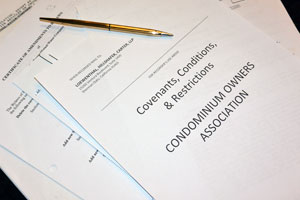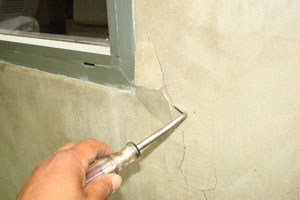LHC Newsletter Vol. 1, No. 1
“Increases in Foreclosures: Boards Must Be Ready to Act”
By Robert D. Hillshafer, Esq.
In California, during the period from April through June 2007, lenders filed just under 54,000 Notices of Default (NOD), which is up 15.4% from the first quarter of this year and up 158% over the second quarter of 2006. Simultaneously, Southern California home sales have been the slowest since 1995.1 Furthermore, on primary mortgages statewide in California, homeowners were a median of five months behind on their loan payments when the lender started the default process.2 These trends should sound alarms for HOA’s, their directors and managers that quick and smart decisions will need to be made in order to minimize inevitable losses in revenue.
Keep in mind that:
- Owners of property in default on mortgages generally have already stopped paying related association assessments.
- Owners of property in default often are “upside down” on the value of the property, meaning that they have no equity and cannot sell the property.
How to Maximize Recoveries Through Due Diligence
With the real estate market declining and foreclosures increasing, Associations will experience losses greater than normal from uncollectible assessments. The goal is to maximize recoveries and minimize losses. Because association boards have a “fiduciary duty” to collect delinquent regular and special assessments; boards also have to expend funds to pay for collection activities. Given the fact that many homeowners in default on their mortgages simultaneously stop paying assessments and property taxes, unless the Association acts quickly and efficiently, any hope of collecting all or some of the delinquent assessments is diminished.
Appropriate “due diligence” can often limit expenditures and aid in the decisions about which remedy best suits a particular situation.
In these times a “cookie-cutter” approach to collection will not be effective. There are two general categories of “remedies” available to association boards when collecting delinquent assessments:
Non-Judicial and Judicial. These translate into a foreclosure on an“Assessment Lien” in the same way as a mortgage lender would,or the filing of a suit to get a court judgment for foreclosure and for money against the delinquent “homeowner.”
When a homeowner becomes delinquent (even for thirty days), the following due diligence should be performed immediately:
- Determine whether there is any equity in the property (and how much) by pulling title information which will reveal the amounts due on trust deeds in comparison to recent sales prices.
- Determine whether a NOD has been recorded by a senior lender (also through title info).
- Determine whether the owner is employed.
The information in 1 and 2 can be obtained virtually without cost. If there is no equity in the property, but the owner is employed, pursuing a non-judicial foreclosure does not make sense, because the property will not produce funds to pay the delinquency. Consequently, pursuit of a money judgment may represent the best chance for collection of the delinquency. A judgment is good for ten years and is renewable.
If a NOD has been recorded by the mortgage lender, the Association’s pursuit of a foreclosure on the property may not make good business sense either, because foreclosure by a senior lender will extinguish any lien of the Association and will prevent the Association from selling the property to collect the delinquency.
In the worst case scenario, if the member is also unemployed, it may be in the Association’s best interest to pursue a non-judicial foreclosure simply to force a change in ownership to a paying member. While this is a rather harsh approach, sometimes this is the most financially feasible approach for the Association to take. Also, non-judicial foreclosure is quicker and cheaper than obtaining a money judgment.In making these decisions, it would be wise to consult with legal counsel in determining which is the best approach on a case by case basis.
Short Sales: Association Consent Required
Defaulted loans in a declining sales market also bring into play another transaction which association’s must be savvy about: the short sale. The short sale is where the lender agrees to accept less than the full amount of the loan and approves a sale to a third party in lieu of foreclosing on the property and trying to resell it to recoup the loan amount. For the Association’s purposes, this transaction is treated just like a sale, but with a twist. The twist is that Association may have to take a reduction on the total amount it accepts, to avoid the risk of saying “all or nothing” and ultimately receiving less. Remember, if a delinquency exists, the sale will not close without Association approval.
If the Association is approached about a short sale, immediately demand a copy of the estimated closing costs. If the closing cost estimate indicates that real estate agents are receiving commis- sions, the Association should refuse to accept a reduction and should demand that the agents contribute to lessen the shortfall. These agents stand to lose an entire commission if the deal falls through. It would be very rare for an agent to be willing to lose an entire commission rather than to forego a portion so as to gain Association approval.
Consultation with Association counsel and your property manager concerning the “best” approach to deal with a given delinquency situation may well save money and preserve your claims.
Tightening Credit and Rising Interest Rates: Implications for Homeowners and Homebuyers
A recent Federal Reserve survey of the 49 largest U.S. banks indicated that over half had tightened their “Non-traditional” (sub-prime) loan standards. 10% of the banks surveyed also indicated that, within the past three months, they had tightened standards for their “Traditional” or “Prime” (e.g. 30 year fixed rate) mortgages. None of the banks reported easing their credit standards.
The credit effects highlighted in this survey will have significant implications for a variety of homeowners and homebuyers, even those who are deemed creditworthy by banks and other lenders. Those who keep well informed about interest rate, real estate and related issues will be better able to navigate these changing times.
Cause…
A variety of market events have occurred recently, and over the past year or so, to create the current mortgage and real estate market climates. These include:
- Default and foreclosure rates for sub-prime home loans have risen rapidly to record levels locally, regionally and across the U.S.
- The “Securitization” or packaging and sale of sub-prime loans in the “secondary” securities markets were meant to “spread” (i.e. reduce) risk. However, for many reasons, these processes have had a near-opposite effect.
This has caused securities rating agencies (e.g.: Standard & Poor’s, Moody’s, et al) to instigate various downgrades and has created huge losses for various domestic mortgage lenders and interna- tional investors.
- Many banks and other mortgage lenders, in response to the growing crisis, have moved to slow, and in some cases stop, sub-prime and even prime mortgage lending activities.
And Effect…
While the most obvious effect of these events has, and should continue to be, a reexamination and closer scrutiny of sub-prime lending; there are effects that may well reach beyond the “less credit-worthy” borrower markets and into the overall consumer real estate marketplace. For example, according to the Wall Street Journal , “Nervous home-mortgage lenders have also begun raising rates or cutting off credit for other types of loans, including Alt-A loans, a grade between prime and sub-prime.”
Sources: Los Angeles Times/Associated Press August 18, 2007 “Behind the U.S. Mortgage Mess”; Wall Street Journal Online, (August 11, 2007)
Beyond these “macro” or larger market effects, individual homeowners and homebuyers will be affected too. Potential impacts may include:
- Less available credit for people who well qualify for prime/traditional loans.
- Some previously viable property transactions becoming unaffordable to qualifying homebuyer/borrower groups such as single people, older individuals or couples, etc.
- A slowing and/or significant reduction in the resale market, making it harder for sellers to find buyers.
- Difficulty for many homebuyers to purchase condominium and other Association related properties, potentially lowering unit market values of the units, impeding refinancing and/or increasing foreclosures which impact association fee payments and budgets.
- A squeeze on middle class homebuyers/borrowers in major urban areas where median home values exceed $500,000 and for whom a “Jumbo” mortgage might be necessary. Jumbo mortgages are loans that exceed the $417,000 limit for government backed mortgage units like Freddie Mac and Fannie Mae.
Conclusion:
Certainly no one can predict interest rates or real estate prices. However, homeowners and homebuyers can and should keep informed about these larger market issues and those in their region, city and in their specific area or community. There are many good sources through which to stay abreast of changing trends. They include:
- The Bank Rate Monitor ( http://www.bankrate.com ). This resource can supply news and information about interest rates for a wide variety of loan types, including mortgages, on a variety of levels, including in your immediate area.
- National, regional and local newspapers and their real estate and/or business sections.
- Various local business and real estate periodicals. Most counties, cities and communities have local business newspapers or maga- zines.
- Real estate agents familiar with and experienced in your specific area or community.
- Other homeowners and homebuyers with similar properties and/or needs.
While interest rate fluctuations and related real estate market changes may be challenging; staying well-informed and remaining objective are two of the best first steps toward meeting the challenge.
State Assembly Bill AB 952 – Good intentions or just bad legislation?
By David A. Loewenthal, Esq.
(daloewenthal@lhclawyers.net)
All homeowner associations, their directors and their members should be wary of California State Assembly Bill 952 which until recently was quietly wending its way through the state capitol. Sponsored by Assemblyman Gene Mullin (Democrat -19th District)
– San Mateo http:// democrats.assembly .ca.gov/ members /a19/ ), this bill may well have been born of good intentions, but it is plainly bad legislation, especially for homeowner and community associations.
Intention VS Outcome:
The bill is being promoted as supportive of low-income owners of properties that are in homeowner associations. An objective reading of the language below and the balance of the legislation strongly indicates that these owners will be given special voting and veto rights apart and away from standard association procedures and practices. In truth, this bill could (and if reintroduced in the future and passed “as is” will) enable a small percentage of an Association’s membership to veto virtually any and all assessment measures (excluding emergency assessments) approved by a majority of homeowners and which exceed 20% of a current assessment.
“The approval of owner-occupants of affordable units, constituting a quorum, casting a majority of the votes of those owner-occupants at the same meeting or election…is obtained…”
“..for the purpose of this subparagraph, ‘affordable units’, means units that are required to be provided to low- or moderate-income purchasers pursuant to a document required by a governmental entity that has recorded, or referenced in a document recorded, in the office of the county recorder…”
If 952 passes…
A homeowners association might call for a vote for an assessment increase, from which the money is to be used to fund badly needed repairs to and painting of the exteriors of common structures in the Association. A large majority of the homeowners vote for the assessment. Under AB 952, the 10% of “affordable” owners in the Association can veto the assessment increase if it is greater than 20% of a current assessment. Under this scenario, the notion of one person (or owner) one vote is cast entirely aside, and the needed repairs go undone.
While this may sound far-fetched, the California Legislative Action Committee (CLAC) of the Community Associations Institute does not think so. In a recent CLAC update, their analysis of AB 952 indicated “Every homeowner association would have to identify the price restricted homes and then prepare two budgets… This second budget will create tremendous hostility among homeowners and will assure that the majority of homeowners have lost control over the destiny of the value of their homes.”3
Common Sense / Common Ground
Affordable housing is an issue with which every city and town in California and the nation struggles. Clearly most, if not all, of the citizens of any community would embrace fair, equitable and consensual solutions to such problems. Under any analysis, passage of AB 952 in its present form would not come anywhere near to solving any such problems. Rather, it would most probably create more problems and issues than any of its supporters suggest that it could or might resolve. In late August 2007, further consideration of the bill was postponed until 2008.
Anyone who has been a director and/or member of a Community Association knows firsthand that those Associations which find common solutions to shared problems are the most successful and enduring. We, who work daily with Associations of all sizes and types, know that unchecked contentiousness within an Association generally results in greater problems and unnecessary expense. Thus common sense would suggest that Assembly Bill 952 makes no sense at all.
1Source: DataQuick Information Systems
2Source: IBID
3CLAC Legislative Update – July 2007:
http://www.caicalif.org/sub_category_list.asp?category=14&title=Hot+Bills
© 2007 by Loewenthal, Hillshafer & Carter, LLP. All rights reserved. Permission is granted to reproduce or transmit in any form any part of this newsletter as long as proper attribution to Loewenthal, Hillshafer & Carter, LLP is given. Due to the rapidly changing nature of the law, information contained in this publication may become outdated. As a result, lawyers and all others using this material must research original sources of authority.
Toll Free 1(866) 474-5529 www.lhclawyers.net


